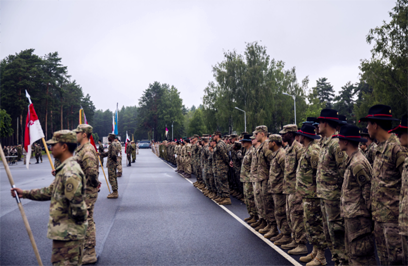December 3, 2019
Nikolai Sokov
On November 7, 2019, the James Martin Center for Nonproliferation Studies and the Center for Energy and Security Studies held a forum titled “US-Russia Dialogue on Nuclear Issues: Does Arms Control Have a Future?” Dr. Nikolai Sokov, a senior fellow with the Vienna Center for Disarmament and Non-Proliferation, prepared the briefing paper, “Avoiding a Post-INF Missile Race,” to address the concerns about a new arms race in Europe arising after the end of the 1987 Intermediate-range Nuclear Forces (INF) Treaty.

Members from thirteen NATO nations, Latvia. (US Marine Corps photo by Sgt. Shawn Valosin/Released)
Though comparisons to the Euromissile crisis of the early 1980s are inevitable, the present situation is different in one important respect: neither Russia nor NATO want a new arms race, and both have demonstrated a degree of restraint. “Nevertheless,” Dr. Sokov argues in the paper, “the situation is fragile, and it is difficult to predict how long mutual restraint can hold.”
Furthermore, the military balance today includes additional, complicating features, including the replacement of nuclear weapons’ missions with high-precision long-range conventional weapons, the enlargement of NATO and the collapse of the Conventional Forces in Europe Treaty, the risk of escalation presented by increased dual-capable delivery systems, as well as the role of Asia in the global strategic balance.
The window of opportunity for addressing these rising concerns is relatively narrow. Since “full-scope arms-control negotiations aiming at legally binding and verifiable treaties are hardly feasible in the current and projected political and security environment,” this CNS brief suggests a “more modest” approach to expanding and securing the restraint that exists, before it disappears altogether.
The support for this briefing paper was provided by the MacArthur Foundation.
